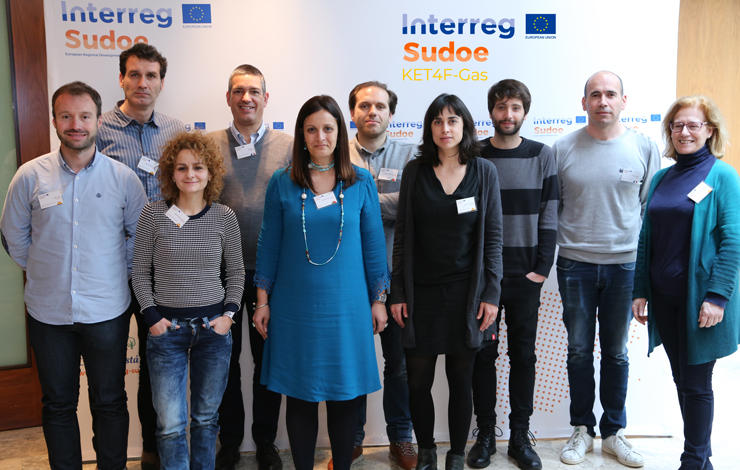30-04-2018

Ana B. Pereiro and João M. M. Araújo, LAQV researchers at FCT NOVA, have been awarded 1.7 million euros funding from the INTERREG SUDOE Program to coordinate the research project KET4F-Gas. The main objective of this project is to reduce the environmental impact of fluorinated gases through the development and implementation of Key Enabling Technologies.
Ana B. Pereiro, project coordinator, highlights that "fluorinated gases (F-gases), widely used in the refrigeration sector, are greenhouse gases with a high global warming potential. Their use has increased dramatically in recent years due to the need to replace the chlorofluorocarbons (CFCs), ozone-depleting substances." In the current context of persistent drought in the regions of Southwest Europe, research on alternatives that contribute to the reduction of greenhouse gas emissions is of upmost priority.
The researcher specifies that the main objective of the KET4F-Gas project is the development and implementation of Key Enabling Technologies (KETs) using alternative solvents, designed using the more benign and efficient green chemistry principles, to recover F-gases employed in refrigeration and air-conditioning equipment’s, reducing their emissions. "The project promotes the growth of applied research and eco-innovation to protect the environment through the application of the KETs, allowing the technological transfer to improve the competitiveness of SME’s in the regions of Southwest Europe" point out João M. M. Araújo, project co-coordinator. The results of this research will also benefit all citizens by raising awareness to the F-gases problem, as well as waste managers, public administrations and industry, since in the regions of Southwest Europe there is no technology applied in this area and enterprises have a clear and imminent need to comply with current legislation.
The INTERREG SUDOE Program supports regional development in the regions of Southwest Europe by funding transnational projects through the European Regional Development Fund (ERDF). The program promotes transnational cooperation to solve common problems within the regions of Southwest Europe, such as low investment in research and development, low competitiveness of SME’s, and exposure to climate change and environmental risks.
The KET4F-Gas project will be developed in three years, starting April 2018 and coordinated by FCT NOVA, with 13 partners from Portugal, Spain and France:
- FEUGA - Fundación Empresa -Universidad Gallega [ES]: Galician entity with a long history of technology transfer and innovation in Galicia.
- Universitat Ramon Llull (IQS – Institut Químic de Sarrià) [ES]: University with a strong connection to the industrial and business world.
- University of Pau and Pays de l’Adour [FR]: Research unit in partnership with TOTAL and CNRS.
- Universidad de Cantabria [ES]: University that contributes to social progress through teaching and scientific excellence.
- APRIA Systems SL [ES]: SME founded in 2006 as a spin-off of Cantabria University, which activity is strongly influenced by R&D offering advanced solutions in the application of new technologies.
- Fundación para el Desarrollo de la Ciencia y la Tecnología (FUNDECYT) y la Fundación Parque Científico y Tecnológico de Extremadura (PCTEx) [ES]: Foundation that develops projects related to entrepreneurship, SME´s competitiveness, innovation, technology transfer, regional development, etc.
- Interlun – GESTOR DE RESIDUOS [ES]: Hazardous waste management company with own treatment facilities.
- Consellería de Medio Ambiente e Ordenación do Territorio - Xunta de Galicia [ES]: It corresponds to the "ministry of the environment" of the regional government of Galicia and will contribute with its experience in environment politics and, in particular, climate change and public administration.
- NetRSDS – NetResiduos Unipessoal, Lda [PT]: NetResiduos promotes waste management information in Portugal. Its contribution to the project is related to its extensive knowledge of the technology, waste managers, and the business associated with fluorinated gases waste management.
- No Waste - Gestão e Recuperação de Resíduos, Lda [PT]: Entity with licence for the collection and management of fluorinated waste.
- Universidade de Vigo (UVIGO - Facultade de Ciencias) [ES]: University that benefits from the synergies within the partnership to deepen the knowledge of the problems associated with the emission of fluorinated pollutants into the atmosphere.
- Talence Innovation Agce Dev Econ [FR]: Large experience in entrepreneurship, technology transfer, territorial economic promotion, internationalization, economic development and innovation monitoring.
- Fédération des Recherches en Environnement (FRE) - Université Clermont Auvergne [FR]: Multidisciplinary entity recognized for its skills in technology transfer in the environmental, energy and biotechnological sectors.
And 6 associates partners from Portugal, Spain and the United Arab Emirates:
- PI – The Petroleum Institute [Abu Dhabi, UAE]: Institution of Khalifa University of Science and Technology with several ongoing projects to replace the F-gases used nowadays in refrigeration, air conditioning and natural gas liquefaction equipment.
- MARE – Mediambiente, Agua, Residuos y Energía [ES]: Public waste management company of the Government of Cantabria.
- FCC Ambito [ES]: Leading company in Spain and Portugal for industrial waste management, by-product recovery and soil decontamination.
- ERP – European Recycling Platform [PT and ES]: The first European Recycling Platform founded in 2002 in response to the first European Directive about Waste of Electrical and Electronic Equipment (WEEE).
- ZERO – Associação Sistema Terrestre Sustentável [PT]: NGO started in the end of 2015 of the common interest of about one hundred people for achievement of sustainable development in Portugal.
